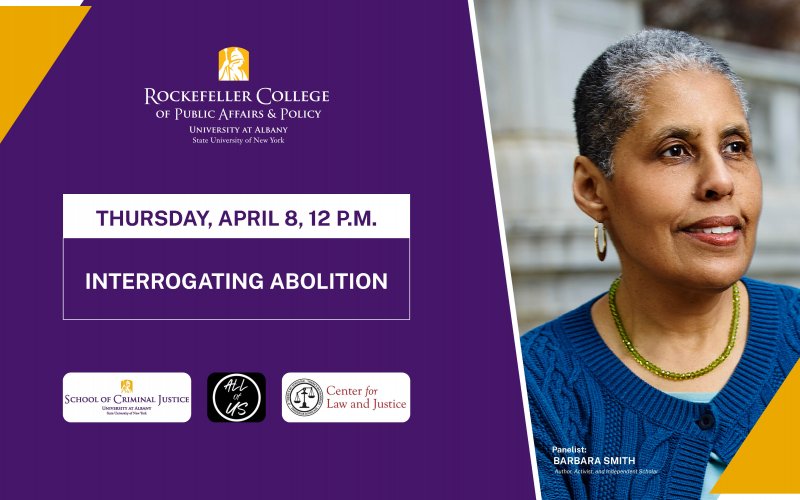Interrogating Abolition

Thursday, April 8, 12:00-1:30pm (via Zoom)
Interrogating Abolition
Description:
Increasing recognition of the harms associated with mass incarceration and intensive policing has renewed public interest in the possibilities of abolitionist approaches to responding to crime, including abolition of prisons and police. Still, much of the public is uncertain about the meaning of abolition and its implications for community safety. In this session, our expert panelists do not attempt to neatly define abolition, but explore the influence of abolitionist thinking on their practical work to transform communities. Panelists discuss how they arrived at abolition, highlight the distinctions between reformist and abolitionist approaches, and offer a vision for reimagining the future of the system of American justice.
Moderator:
Tawnee Crews, M.A., Ph.D. student, Department of Sociology, University at Albany
Panelists:
Xochi Cartland
Xochi Cartland is a senior at Brown University studying literary arts. Their background is in disability justice, and they work for the national nonprofit Project LETS, which is built by and for folks with lived experience with madness, mental illness, neurodivergence, trauma, and disability. Xochi is also part of the Transformative Justice Program at Brown in their role as Lead Student Coordinator. Their primary interest resides in building grassroots infrastructure for responding to harm and violence that operate outside of institutions.
Lamarr Reid
Lamarr Reid is currently working toward a bachelor’s degree in social studies. He is a free-incarcerated individual who is 20 years in and of the struggle. His hyphenated status is a contrast of his free range of being and thinking against his physical captivity, which means that he is resisting the arrest of mind although his body is confined.
Barbara Smith
Barbara Smith is an author, activist, and independent scholar who has played a groundbreaking role in opening up a national cultural and political dialogue about the intersections of race, class, sexuality, and gender. She was among the first to define an African American women’s literary tradition and to build Black women’s studies and Black feminism in the United States. She was a co-founder of the Combahee River Collective and of Kitchen Table: Women of Color Press, the first U.S. publisher for women of color to reach a wide national audience. She served two terms on the Albany Common Council (2006-13). In 2005, she was nominated for the Nobel Peace Prize.
Shawn Young
Shawn Young is the co-founder of All Of Us Community Action Group, a Black-led grassroots organization committed to liberation and the end of all forms of oppression and exploitation. Shawn’s experience includes community organizing, activism, and advocacy. Currently, Shawn is an integral member of the community leadership of the Greater Capital Region, which demands that Black Lives Matter, and calls for an end to police brutality and state sanctioned violence. As the co-founder of All Of Us, Shawn has led civil actions, community conversations, and facilitated the leadership development of young people throughout the Capital Region.
Sponsors:
Rockefeller College of Public Affairs & Policy
School of Criminal Justice
All of Us Community Action Group
Center for Law and Justice


